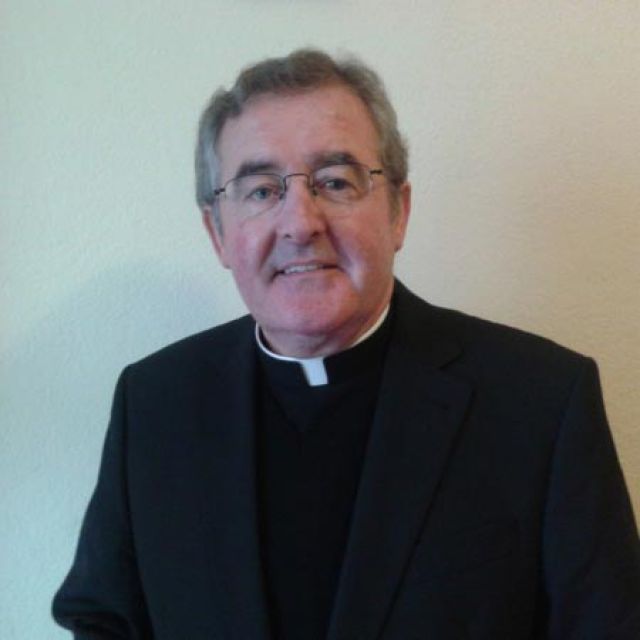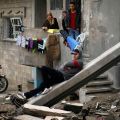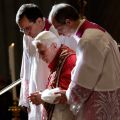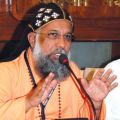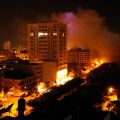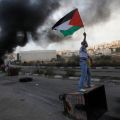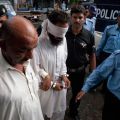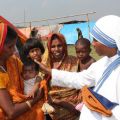News/International
New bishop of troubled Irish diocese says abuse victims to be priority
By Michael Kelly, Catholic News ServiceDUBLIN - The newly appointed bishop of Cloyne vowed he would make healing the lives of victims of abuse in the diocese a priority.
Pope appeals for peace in Mideast, greets pilgrims from four continents
By Carol Glatz, Catholic News ServiceVATICAN CITY - Greeting hundreds of Christians from Lebanon, Pope Benedict XVI encouraged their presence in the Middle East and launched a fresh appeal for peace in the region.
Celebrating Church's universality, Pope creates new cardinals
By Francis X. Rocca, Catholic News ServiceVATICAN CITY (CNS) -- Recalling that Christ's mission transcends "all ethnic, national and religious particularities," Pope Benedict XVI created six new cardinals from four different continents, representing the Latin rite of the Catholic Church as well as two Eastern Catholic Churches.
Trappists find their niche in manufacturing caskets
By Ruane Remy, The Catholic RegisterFrom forests of walnut, oak and pine on their land near Dubuque, Iowa, often comes the wood that Trappist monks at the New Melleray Abbey hand carve into funeral caskets.
Local Indians thrilled new cardinal one of their own
By Vanessa Santilli-Raimondo, The Catholic RegisterTORONTO - Canada’s Syro-Malankara Catholic community may be modest in size but its members are reacting with immense pride to the elevation of its first cardinal.
Major Archbishop Baselios Cleemis Thottunkal, the head of the Syro-Malankara Catholic Church, was to be among eight prelates elevated to cardinal by Pope Benedict on Nov. 24. He is the first cardinal ever selected from the India-based Syro-Malankara Church.
For the 250-member Syro- Malankara congregation of Toronto, the unexpected honour is cause for celebration.
“I’m really, really thrilled for this recognition because the universal Church is recognizing our Church as a deeper part of communion,” said Sebin Alexander, 24, a parishioner at St. Mary’s Malankara Catholic Mission in Toronto.
The elevation of the head of the Syro-Malankara Catholic Church puts the entire world congregation of approximately 500,000 members into the limelight, said Fr. John Kuriakose, pastor at St. Mary’s.
“Hopefully, since he received this elevation, it will put (the new cardinal) in a better position to work towards the unification of the Church,” Kuriakose said.
A handful of parishioners from St. Mary’s went to Rome for the elevation ceremony, where they expected to meet up with about 80 members of the faith from across North America. There is a second Canadian mission in Edmonton and approximately 10 congregations scattered across the United States, Kuriakose said.
The Syro-Malankara Church was founded in India by St. Thomas the Apostle in AD 52. In its long history it has experienced schisms and a break with Rome. Full communion for the Syro- Malankara Church with Rome was re-established in 1930.
Church members are hopeful that Thottunkal’s elevation to cardinal will help bring unification to the many branches of India’s Christian churches.
“Since this happened, it is with great hope we can extend our hands to our brothers in the Orthodox community, in the Jacobite community,” Alexander said, referring to the many splits in the Indian Church. “We can have more of an ecumenical movement to bring them back to the Church.
“It’s also a reminder of my responsibility as a youth to really understand the call of the evangelization in this culture and to have a greater dedication to the Church.”
Francis Thazhamon was to join the pilgrims in Rome.
“This is something he (Thottunkal) deserves and the universal Church is moving in the right direction realizing the need of the Church at this time,” said Thazhamon.
Thottunkal, 53, is one of six new cardinals being created by the Pope. They hail from six different countries and, in a rare twist, none are European. They are U.S. Archbishop James M. Harvey, 63, Lebanon’s Maronite Patriarch Bechara Rai, 72, Nigerian Archbishop John Olorunfemi Onaiyekan of Abuja, 68, Colombian
Archbishop Ruben Salazar Gomez of Bogota, 70, and Philippine Archbishop Luis Tagle of Manila, 55.
Irish bishops reiterate teaching on right to life of mother, child
By Sarah MacDonald, Catholic News ServiceDUBLIN - Expressing anguish and sorrow over the death of a pregnant woman in an Irish hospital, the country's Catholic bishops said that pregnant women must receive all treatment to save their lives, even if it results in the unintended death of an unborn child.
The statement Nov. 19 came three weeks after the deaths of Savita Halappanavar, 31, who died after a miscarriage, and her unborn child. Halappanavar died after hospital medical staff determined they could not end the child's life because they could detect a fetal heart beat, even as the woman's husband, Praveen, urged them to save his wife's life.
Halappanaver's death Oct. 28 at University Hospital Galway has led to an outpouring of public anger. Thousands of people have taken to the streets calling for the country's constitutional ban on abortion to be overturned.
In its statement, the Standing Committee of the Irish Catholic Bishops' Conference described the case as "a devastating personal tragedy" for the Halappanavar family and acknowledged that the circumstances of her death had "stunned our country."
The bishops' statement sought to clarify Church teaching on the need for medical intervention to save the life of a mother. The bishops said they believe Ireland's medical guidelines contain adequate ethical provisions to allow medical staff to intervene as long as necessary steps have been taken to save both mother and unborn child.
The bishops insisted that the Catholic Church has never taught that the life of a child in the womb should be preferred to that of a mother.
"Whereas abortion is the direct and intentional destruction of an unborn baby and is gravely immoral in all circumstances, this is different from medical treatments which do not directly and intentionally seek to end the life of the unborn baby," the bishops said in their statement.
The bishops also reiterated a statement made by Dublin Archbishop Diarmuid Martin to Catholic News Service Nov. 18 that Ireland is a safe place for expectant mothers. Pointing to international health care data, the bishops said "Ireland, without abortion, remains one of the safest countries in the world in which to be pregnant and to give birth. This is a position that should continue to be cherished and strengthened in the interests of mothers and unborn children in Ireland."
The maternal mortality rate in Ireland stands at 4.1 per 100,000 births and is among the lowest in Europe.
Martin told CNS he believed doctors, nurses and midwives "set out always to save lives."
"The fact that our maternal mortality is so low is a sign that there is something that is working well in the system," he said.
Meanwhile, pro-life campaigners have expressed concern at the appointment of Sabaratnam Arulkumaran, head of obstetrics and gynecology at St. George's, University of London, as chairman of a Health Service Executive inquiry into Halappanavar's death. They cited a 2009 statement in which he argued that abortion should be a legal right for women.
Pope condemns escalating Gaza conflict, calls for truce, talks
By Carol Glatz, Catholic News ServiceVATICAN CITY - Pope Benedict XVI condemned escalating hostilities between Israel and the Palestinians, saying hatred and violence are never an appropriate solution to problems.
He also called for greater efforts to promote a truce and peace negotiations.
"I am following with great concern the escalation of violence between Israelis and Palestinians in the Gaza Strip," the Pope said at the end of his general audience Nov. 21.
"Hatred and violence are not the solution to problems," he said to applause from those gathered in the Paul VI hall.
"I encourage the initiatives and efforts of those who are seeking to establish a ceasefire and to promote negotiations."
He also called on leaders on both sides of the conflict to make "courageous decisions in favour of peace and put an end to a conflict that has negative repercussions throughout the entire Middle East region, which is already troubled by too many conflicts and is in need of peace and reconciliation."
The Pope expressed his closeness to victims and all those suffering because of the violence.
His appeal came as both sides in the conflict launched fresh attacks. Just hours before the Pope spoke, a bomb exploded on a bus in Tel Aviv, wounding at least 10 people. That attack followed a week-long Israeli offensive in the Gaza Strip aimed at stopping rocket strikes by Palestinian militants.
More than 130 Palestinians and at least five Israelis have been killed since Israel launched its offensive.
Catholics on both side of the Gaza border pray for hostilities to end
By Judith Sudilovsky, Catholic News ServiceJERUSALEM - As diplomatic efforts were underway to reach a ceasefire agreement between Hamas and Israel Nov. 20, Catholics on both sides of the Gaza border prayed for peace.
"When we pray for peace, we pray for peace for everyone," said Fr. Yoel Salvaterra, who serves the Hebrew-speaking Catholic community in Beersheba, after a morning in which more than 20 rockets landed in the city. "Our prayers have no borders. We know we are suffering here and they are suffering there. It is just suffering."
Egypt was reported to have been brokering a ceasefire agreement between Hamas and the Israeli government late Nov. 20, according to news reports.
The parish celebrated Mass Nov. 18 in the church bomb shelter, Salvaterra said, and only 15 people came to pray, about half the normal number. The community has about 150 members.
"People live in fear," he said. "Everybody is staying home. Sometimes they call me for assurance, sometimes I call them. The situation has not been easy as even before the Israeli operation we suffered from rockets once or twice a month. The uncertainty was difficult."
Though several homes in Beersheba took direct hits from the rockets, no one from the community has been injured, he said.
Going to Sunday Mass is a way of supporting one another and finding strength through prayer, said Rafoul Assy, 50, who hails from the northern all-Melkite village of Fassuta and has lived in Beersheba for more than 20 years. Although Assy was unable to attend Mass because of his work, he said his wife and four children found comfort in the familiar routine of the prayers.
"The Mass itself took only three-quarters of an hour but they stayed there for over an hour talking to the other people," said Assy. "It is difficult for the children. They spend their days in the bomb shelter. Every time there is a siren the little one grabs the iPad and runs to the shelter. They are afraid."
In Gaza, George Antone, 31, project manager for the Pontifical Mission for Palestine, told Catholic News Service Nov. 20 that people are staying home because it is too risky to leave. No one knows where Israel's bombs may land next, he said.
"The situation here is terrible. Last night it was as if we were living in hell. Every 15 minutes you could hear an explosion."
One member of Holy Family parish in Gaza died of a heart attack during a bombing and had just been buried at the church cemetery, he said. Otherwise, people leave their homes only to get essentials. Supplies such as fuel and bread are running low because flour can't be delivered to the bakeries, he said.
"I don't like the killing on either side. I respect life," Antone said. "This is not the way in which we can find a solution. Peace never comes with blood. That is what we say to the people in church. This will lead to nothing only a very bad scenario on both sides and the people will pay the price."
He added that he sees the conflict between Hamas and the Israeli government as not only political but also one stemming from religious fanaticism from both Muslims and Jews.
"We Christians are not political, we call for peace and to save lives," Antone said. "This conflict will lead to nothing. We pray a real truce will be reached and then afterward they have to start negotiating for peace. That is the only way to solve the problem. They have to sit and speak and find a way where there will be no war for our children and the coming generations."
In a Nov. 19 report Sami El-Yousef, regional director for the Catholic Near East Welfare Association's office in Jerusalem, noted widespread destruction in Gaza and said almost all of the Christian institutions have sustained some damage from the shelling in the form of broken glass and doors.
He said children and the elderly are paying the heaviest price and called for prayers that the hostilities would end as soon as possible.
Nativity story's significance continues to unfold today, Pope writes
By Carol Glatz and Francis X. Rocca, Catholic News ServiceVATICAN CITY - The Nativity story, like the whole story of Christ, is not merely an event in the past, but has unfolding significance for people today, with implications for such issues as the limits of political power and the purpose of human freedom, Pope Benedict writes in his third and final volume on the life and teachings of Jesus.
Jesus of Nazareth: The Infancy Narratives is only 132 pages long, yet it includes wide-ranging reflections on such matters as the significance of the virgin birth and the distinctive views of nature in ancient pagan and Judeo-Christian cultures.
The book was formally presented at the Vatican Nov. 20, and was scheduled for publication in English and eight other languages in 50 countries Nov. 21.
In the book, Pope Benedict examines Jesus' birth and childhood as recounted in the Gospels of Sts. Matthew and Luke. His interpretation of the biblical texts refers frequently to the work of other scholars and draws on a variety of academic fields, including linguistics, political science, art history and the history of science.
The book's publication completes the three-volume Jesus of Nazareth series, which also includes From the Baptism in the Jordan to the Transfiguration (2007) and Holy Week: From the Entrance into Jerusalem to the Resurrection (2011).
Jesuit Father Federico Lombardi, Vatican spokesman, said at the Nov. 20 book launch that the three books are the "fruit of a long inner journey" by Joseph Ratzinger, whose personal views they represent. While much of what the Pope says is accepted Catholic dogma, the texts themselves are not part of the Church's magisterium and their arguments are free to be disputed, Lombardi said.
In his new book, the Pope argues that Matthew and Luke, in their Gospel accounts, set out to "write history, real history that had actually happened, admittedly interpreted and understood in the context of the word of God."
The Pope calls the virgin birth and the Resurrection "cornerstones" of Christian faith, since they show God acting directly and decisively in the material world.
"These two moments are a scandal to the modern spirit," which expects and allows God to act only in ideas, thoughts and the spiritual world, not the material, he writes. Yet it is not illogical or irrational to suppose that God possesses creative powers and power over matter, otherwise "then He is simply not God."
Pope Benedict examines the political context of the time of Jesus' birth, which featured both the so-called "Pax Romana" — the widespread peace brought by the Roman ruler Caesar Augustus — and King Herod's thirst for power, which led to the slaughter of the innocents.
"Pax Christi is not necessarily opposed to Pax Augusti," he writes. "Yet the peace of Christ surpasses the peace of Augustus as heaven surpasses Earth."
The political realm has "its own sphere of competence and responsibility"; it oversteps those bounds when it "claims divine status and divine attributes" and makes promises it cannot deliver.
The other extreme comes with forms of religious persecution when rulers "tolerate no other kingdom but their own," he writes.
Any sign God announces "is given not for a specific political situation, but concerns the whole history of humanity," he writes.
The Pope writes that the Three Wise Men symbolize the purification of science, philosophy and rationality.
"They represent the inner dynamic of religion toward self-transcendence, which involves the search for truth, the search for the true God," the Pope writes.
The Pope also argues that the star of Bethlehem was a true celestial event. It "seems to be an established fact," he writes, that the conjunction of Jupiter and Saturn happened in 7-6 B.C., which "as we have seen is now thought likely to have been when Jesus was born."
A key topic in the book is the role of human freedom in God's divine plan for humanity.
"The only way (God) can redeem man, who was created free, is by means of a free 'yes' to His will," the Pope writes. It is precisely "the moment of free, humble yet magnanimous obedience," such as Mary and Joseph showed when listening to God, "in which the loftiest choice of human freedom is made."
Jesus, too, in His human freedom, understood He was bound to obedience to His heavenly Father, even at the cost of His earthly life.
The missing 12-year-old, rediscovered by an anxious Mary and Joseph in the Temple, was not there "as a rebel against His parents, but precisely as an obedient (son), acting out the same obedience that leads to the cross and the Resurrection," the Pope writes.
Pakistani High Court dismisses blasphemy charge against Christian girl
By Catholic News ServiceISLAMABAD, Pakistan (CNS) -- The Islamabad High Court ordered police to dismiss blasphemy charges against a Christian Pakistani girl whose arrest and detention drew international condemnation.
The ruling from Chief Justice Iqbal Hammeed ur Rehman Nov. 19 said there was no evidence that Rimsha Masih burned papers from the Quran, reported Pakistan's Dawn news agency.
"The court has quashed the case, declaring Rimsha innocent," Akmal Bhatti, the girl's attorney, told Agence France-Presse.
Rimsha was taken into police custody Aug. 18 after a resident of the area in which the girl and her family lived accused her of burning pages of the Islamic holy book. She was released on bail Sept. 8.
Two weeks after Rimsha was picked up, Khalid Jadoon Chishti, the imam or prayer leader who accused her of burning pages of the Quran, was taken into police custody. According to a police official quoted by the Associated Press, witnesses claim the imam tore pages from a Quran and planted them along with burned pieces of paper in the girl's bag.
He faces charges of planting evidence and desecrating the Quran used against the girl. The courts have yet to rule in the case.
Rimsha's parents said she is 11 years old and has Down syndrome; a court-appointed physician reported she was about 14 and is developmentally delayed.
Paul Bhatti, the only Christian member of Pakistan's federal cabinet, confirmed the high court had dismissed the case.
"I welcome this order. Justice has been done and the law of the land has been upheld by the court," he told Agence France-Presse.
"It will send out a positive image of Pakistan in the international community that there is justice for all and that society has risen up for justice and intolerance," he said.
Out of fear for their safety, Rimsha and her family moved to an undisclosed location after the girl's release.
Catholic relief workers praised by Muslim refugees in Indian camps
By Anto Akkara, Catholic News ServiceKOKRAJHAR, India (CNS) -- Besides her family, the most valuable things Majoni Bibi has these days are a few clothes, medicated mosquito nets, cooking utensils, water storage buckets and sleeping mats.
Bibi, a Muslim refugee forced with her family from their home as fighting erupted in July between tribal Bodos and Muslim settlers in Assam state, praised Catholic relief workers for the donations as her family continues to live in a camp for internally displaced people.
"We are very happy the Christians have helped in a big way. But for them, our life would have been miserable," said Bibi as she held her infant, who was born the camp at Basagaon.
Bibi is among hundreds of thousands of people displaced by months of ethnic clashes. She told Catholic News Service that had it not been for Catholic-run charities and the efforts of the Missionaries of Charity sisters, she and her family would have little.
"These sisters cared for us and (church workers) gave valuable and useful things," said Bibi, pointing to Sister Jacoba, superior of the Missionaries of Charity convent in nearby Bongaigaon.
Church workers have visited the camp and several others in the region, providing food and a variety of services and supplies.
The fighting has left more than 90 people dead and about 500,000 homeless in Kokrajhar region. More than 200,000 refugees -- the majority of them Muslims -- languish in 130 relief camps scattered across four districts.
Several Muslim refugees shared their appreciation for the workers' dedicated service in the camps in the Bodo heartland.
"The only people who came out to help us were the Christians," said Jahanara Begum, living in a riverbed camp in Basagaon.
Begum told the church workers that she had lost thousands of pounds of raw rice she had stocked in her home for sale when she, her husband and five children fled Dewalguri, a village attacked July 23.
"The church workers have shown real love for us and visited the camps regularly and attended to our people," Begum said.
Father David Napoleon, director of the Bongaigaon Diocese's social service program, said he has coordinated his work with Catholic Relief Services and Caritas India. More than two dozen emergency workers, including medical teams from St. Augustine Hospital in Bongaigaon joined the Missionaries of Charity sisters in visiting the camps.
"But it has not been easy. Nearly 15,000 Christians among the Bodos have also become homeless and some of our people have been strongly objecting to reaching out to the Muslim refugees," he said.
"But we told them that this was a humanitarian crisis and as true Christians, we have the duty to help all those in need," he added.
Harun Rashid Mondal, coordinator of a relief committee distributing rice and other food to refugee families, told CNS that "whatever may be the international talk of conflict between Muslims and Christians, here Christians are helping us like real brothers."
"The care and attention the Christians have shown to our people has helped change their attitude to the Christians. Real friends are those who help the people in need. The sisters have shown us what is real love," Mondal, a Muslim, said of the Missionaries of Charity who had helped bathe refugee children.
The anxiety of the Bodo community over Christians reaching out to Muslims was evident during a visit to Bodo relief camps in the town of Kokrajhar.
"My husband was stabbed (to death) and how can we can go back and live in the same place?" asked Korida Sanhala of Fakiragram village, who was at the Bodo camp.
"Sister, why do you still go to the camps of those (Muslim) people?" posed another Bodo woman to Missionaries of Charity Sister Leo Therese, even as men of the Bodo community rejected the plea of government officials to return the refugees to their village.
"They should not be helped," a young Bodo refugee woman reminded another nun when the church workers reached the Catholic relief camp at Kailo Mailo, more than 60 miles from Basagaon.
"Now our main focus is on youth-centered programs to deal positively with their trauma and anger and foster healthy interpersonal relationship," said Kaplianlal Thangluai, program officer for CRS in northeast India.
The program is facilitated by CRS-trained volunteers selected from among the refugees and residents of the host villages.
"We are also running a child-friendly space for children in the relief camps, as the children do not go to school," Thangluai added.

